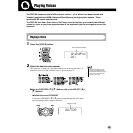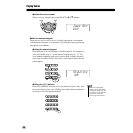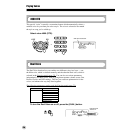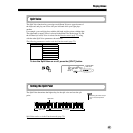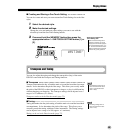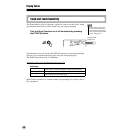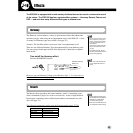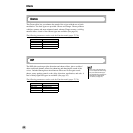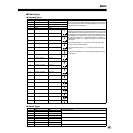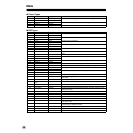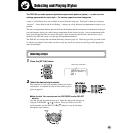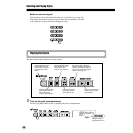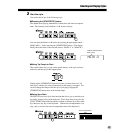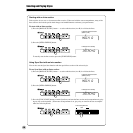
31
Effects
The PSR-292 is equipped with a wide variety of effects that can be used to enhance the sound
of the voices. The PSR-292 has four separate effect systems — Harmony, Reverb, Chorus and
DSP — and each has many different effect types to choose from.
The Harmony section features a variety of performance effects that enhance the
melodies you play when using the accompaniment styles of the PSR-292. A total
of twenty-six Harmony types are available. (See page 33.)
Tremolo, Trill and Echo effects can be used even if accompaniment is off.
There are five different Harmony Types that automatically create harmony parts
(for notes played in the upper section of the keyboard) to match the accompani-
ment chords.
Turn on/off the Harmony effect.
Press the [HARMONY] button.
Harmony type and Harmony
Volume (when Harmony Type 1 - 5 is selected) can
be set in the Function mode (page 76).
The Reverb effect reproduces the natural ambient “wash” of sound that occurs
when a instrument is played in a room or concert hall. A total of eight different
Reverb types simulating various different performance environments are avail-
able. (See page 33.)
The following par
ameters can be set in the Function mode (pages 75, 76).
CATEGORY SELECT
Effect Reverb Type
Main Voice Reverb Send Level
Dual Voice Reverb Send Level
Split Voice Reverb Send Level
Harmony
• For the first five Harmony Types
(Duet, Trio, Block, Country, and
Octave), chords must be played
in the Accompaniment area of
the keyboard.
The Harmony voice(s) change in
pitch to best match the chords
you play.
• The speed of the Trill, Tremolo,
and Echo effects depends on the
Tempo setting (page 33).
• Each voice of the PSR-292 has
its own independent Harmony
setting.
001
GrandPno
Indicates Harmony
effect is on.
Reverb
• Twelve additional Reverb Types
are available when controlling the
PSR-292 from a MIDI device.
(For details, See page 92.)
• Each style of the PSR-292 has its
own independent Reverb setting.



